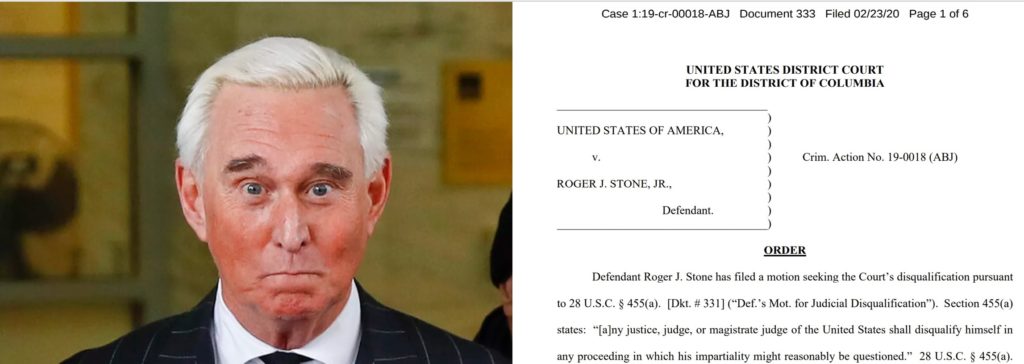Federal Court concludes that Roger Stone’s lawyers’ motion to disqualify Judge Amy Berman-Jackson is “nothing more than an attempt to use the Court’s docket to disseminate a statement for public consumption that has the words ‘judge’ and ‘biased’ in it”
www.merriam-webster.com › shenanigan 1 : a devious trick used especially for an underhand purpose. 2a : tricky or questionable practices or conduct —usually used in plural. b : high-spirited or mischievous activity —usually used in plural.
This is the second article I’ve written on the Roger Stone case. The first from February 12th, “The Roger Stone Case: Whether Outraged or Relieved, At Least Be Informed”, can be found here.
Roger Stone’s five lawyers are continuing their high-spirited activity. They filed a motion seeking to disqualify Federal District Court Judge Amy Berman-Jackson. The factual underpinning of their argument was that they had filed a motion for a new trial, alleging that one of the twelve jurors lied on their juror questionnaire and during their questioning by the Court, and that those lies related to their bias against Roger Stone and Donald Trump. That motion was pending during the sentencing hearing on February 20, 2020. Stone’s lawyers argue that during that hearing, Judge Berman-Jackson made statements that give rise to a reason to question her impartiality in connection with that pending motion for new trial based on alleged juror misconduct. They relied on section 455(a) of title 28 of the United States Code (title 28 governs the federal judiciary and judicial procedure). Section 455(a) states: “any justice, judge, or magistrate judge of the United States shall disqualify himself in any proceeding in which his impartiality might reasonably be questioned.” The purpose of section 455(a) is to promote public confidence in the judiciary by avoiding even the appearance of impropriety whenever possible, and in the District of Columbia, where this court sits, recusal is required when “a reasonable and informed observer would question the judge’s impartiality.”
What did Roger Stone’s lawyers argue? They point to this section of Judge Berman-Jackson’s sentencing:
“Sure, the defense is free to say: So what? Who cares? But, I’ll say this: Congress cared. The United States Department of Justice and the United States Attorney’s Office for the District of Columbia that prosecuted the case and is still prosecuting the case cared. The jurors who served with integrity under difficult circumstances cared. The American people cared. And I care.”
Stone’s lawyers argued that the Judge’s use of the words “jurors” and “with integrity” (which Judge Berman-Jackson noted were “three words on the 88th page of the 96-page transcript of a two-and-a-half-hour hearing”) are disqualifying because there is a pending motion for new trial with respect to a single juror, and the hearing has not yet taken place. They wrote:
“The Court’s ardent conclusion of ‘integrity’ indicates an inability to reserve judgment on an issue which has not yet been heard. Moreover, the categorical finding of integrity made before hearing the facts is likely to lead a reasonably informed observer to question the District Judge’s impartiality … The premature statement blessing ‘the integrity of the jury’ undermines the appearance of impartiality and presents a strong bias for recusal.”
How did Judge Berman-Jackson rule? Writing in the third person (“the Court, “it”, and “its”), the Judge wrote the following:
“Its characterization of the jurors’ service was voiced on the record, and it was entirely and fairly based on the Court’s observations of the jurors in the courthouse; through the nine days of voir dire and trial, when they were uniformly punctual and attentive, and through their thoughtful communications with the Court during deliberation … and the delivery of the verdict … Moreover, the record dating back to January of 2019 reflects that the Court took each issue raised by this defendant seriously; that on each occasion, it ruled with care and impartiality, laying out its reasoning in detail; and that it was scrupulous about ensuring his right to a fair trial. It granted important evidentiary motions in his favor; it proposed utilizing a written questionnaire to ensure that the parties could receive more information than is usually available for jury selection; it struck 58 potential jurors for cause based on the defendant’s motions or on its own motion; and it repeatedly resolved bond issues in his favor, even after he took to social media to intimidate the Court, after he violated conditions imposed by the Court, after he was convicted at trial, and after he was sentenced to a term of incarceration. Moreover, at the sentencing hearing that forms the sole basis for the defendant’s motion, the Court concluded, based in part on many considerations put forth by the defendant, that it was appropriate to vary from the applicable Advisory Sentencing Guideline Range.”
And finally the conclusion:
“At bottom, given the absence of any factual or legal support for the motion for disqualification, the pleading appears to be nothing more than an attempt to use the Court’s docket to disseminate a statement for public consumption that has the words “judge” and “biased” in it. For these reasons, defendant’s motion is hereby DENIED. SO ORDERED. AMY BERMAN JACKSON United States District Judge DATE: February 23, 2020”
The five lawyers that filed the motion to disqualify Judge Berman-Jackson are, no doubt, fine attorneys. This has been, and continues to be a grueling legal case (indeed, with 343 documents having been docketed, that is more than 1 each business day since the indictment was filed on January 24, 2019). I trust they’re sleeping well at night … high-spirited activity can be tiring.

